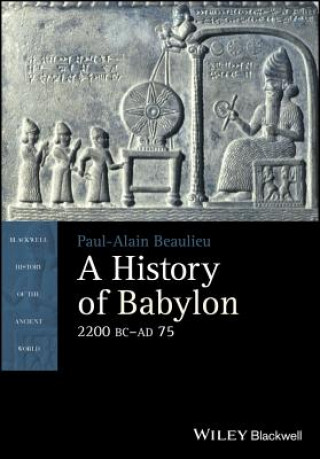
Kod: 04956357
History of Babylon
Autor Paul-Alain Beaulieu
The aim of this project is to write a narrative history of Babylon from the time of its First Dynasty (1880-1595) until the last centuries of the city's existence during the Hellenistic and Parthian periods (ca. 331-75 AD). During ... więcej
- Język:
 Angielski
Angielski - Oprawa: Miękka
- Liczba stron: 312
Wydawca: John Wiley and Sons Ltd, 2018
- Więcej informacji o książce

Zobacz książki o podobnej tematyce
-

Berserk Deluxe Volume 2
213.64 zł -1 % -

Warriors #4: Rising Storm
31.16 zł -15 % -

Hunger Games 4 Book Paperback Box Set
167.29 zł -23 % -

How to Draw
162.83 zł -6 % -

Salt, Fat, Acid, Heat
138.14 zł -14 % -

The Hobbit
43.61 zł -15 % -

Principles
125.69 zł -13 % -

Breath
49.18 zł -14 % -

Q&A a Day
52.21 zł -26 % -

Convenience Store Woman
35.31 zł -26 % -

The Psychology of Money
105.55 zł -12 % -

Halo: The Fall of Reach: Volume 1
75.90 zł -13 % -

The Picture of Dorian Gray
39.16 zł -13 % -

Monogatari Series Box Set Limited Edition
395 zł -12 % -

The 4-Hour Workweek
105.35 zł -12 % -

Mort
70.53 zł -14 % -

Flowers Colour by Numbers
50.70 zł -

The Hunger Games
36.42 zł -21 % -

The Old Man and the Sea
25.19 zł -26 % -

Jade Legacy
52.62 zł -15 % -

Pride and Prejudice
34 zł
Podaruj tę książkę jeszcze dziś
- Zamów książkę i wybierz "Wyślij jako prezent".
- Natychmiast wyślemy Ci bon podarunkowy, który możesz przekazać adresatowi prezentu.
- Książka zostanie wysłana do adresata, a Ty o nic nie musisz się martwić.
Więcej informacji o History of Babylon
Za ten zakup dostaniesz 164 punkty
 Opis
Opis
The aim of this project is to write a narrative history of Babylon from the time of its First Dynasty (1880-1595) until the last centuries of the city's existence during the Hellenistic and Parthian periods (ca. 331-75 AD). During most of its history, Babylon was the capital of a kingdom that corresponded roughly to the southern and central parts of Iraq, an area commonly designated as 'Babylonia', although this term did not come into widespread use until Babylon had lost its independence and become a province of the Persian and Seleucid empires. At other times Babylon's rule extended well beyond Babylonia, for instance during the second half of the 6th century, when the city was the capital of a vast empire stretching from the Persian Gulf to Cilicia and from Jerusalem to the confines of Armenia. During the second millennium Babylon had received, synthesized and transformed the heritage of the old civilization of Sumer and Akkad to become the main expression of Mesopotamian civilization. Babylon even wielded decisive cultural influence over Assyria, although the latter was often more powerful politically and militarily. Babylonian became the international language of culture and diplomacy during the Late Bronze, and in almost every capital of the Near East including Egypt an elite of scribes copied and studies classics of Babylonian literature and wrote official correspondence to other courts in the Middle Babylonian dialect. Although the cosmopolitan reach of Babylonian receded in the first millennium, the development of Babylonian science and scholarship ensured the continued influence of that civilization even after the loss of independence. As late as the second century BC, Greek astronomers like Hipparchus borrowed entire sets of data and parameters from their Babylonian colleagues. At the same time, however, Jewish thinkers were spreading the view, inherited from the prophets of the Biblical period, of Babylon as the emblematic city of imperial hubris, idolatry and corruption. This view entirely dominated the imagination of the Western and Islamic worlds until the 19th century, when the rediscovery of cuneiform documentation allowed historians to redress the balance and separate history from myth. Therefore, to write a History of Babylon means not only to write a history of the most important phase in the development of Mesopotamian culture, but also to understand how an ancient and complex civilization became memorialized for posterity as a purely theological symbol.
 Szczegóły książki
Szczegóły książki
Kategoria Książki po angielsku Humanities History Regional & national history
282.46 zł
- Pełny tytuł: History of Babylon
- Autor: Paul-Alain Beaulieu
- Język:
 Angielski
Angielski - Oprawa: Miękka
- Liczba stron: 312
- EAN: 9781405188982
- ISBN: 1405188987
- ID: 04956357
- Wydawca: John Wiley and Sons Ltd
- Waga: 486 g
- Wymiary: 169 × 243 × 18 mm
- Data wydania: 02. February 2018
Ulubione w innej kategorii
-

Hundred Years' War on Palestine
57.98 zł -15 % -

Ethnic Cleansing of Palestine
61.52 zł -15 % -

History of Japan
80.15 zł -7 % -

Ten Myths About Israel
55.65 zł -10 % -

Strange Death of Europe
70.53 zł -14 % -

Decline and Fall of the Roman Empire
22.46 zł -29 % -

Secret History
66.38 zł -11 % -

God's Playground A History of Poland
293.19 zł -

Mayflower
75.90 zł -13 % -

How to be a Victorian
52.21 zł -23 % -

Plantagenets
61.52 zł -23 % -

General's Son
85.21 zł -6 % -

Iran: A Very Short Introduction
43.10 zł -23 % -

Temples of Karnak
655 zł -

Cuneiform
47.56 zł -23 % -

Twenty Years A-Growing
43.10 zł -23 % -

China in Africa
156.25 zł -

History of Witchcraft in England from 1558 to 1718
79.34 zł -

Bohemian Paris
81.26 zł -6 % -

Islandman
53.63 zł -9 % -

Lancaster And York
88.95 zł -

Alexiad
85.41 zł -10 % -

Inside Hitler's Greece
100.59 zł -9 % -

Modern France: A Very Short Introduction
57.98 zł -5 % -

Diana: Her True Story - In Her Own Words
52.62 zł -15 % -

The Fourth Turning
79.64 zł -13 % -

The Oxford History of Ancient Egypt
66.18 zł -23 % -

Churchill: The Power of Words
70.53 zł -14 % -

Palestine
91.79 zł -14 % -

Korean History in Maps
123.67 zł -7 % -

Great Gatsby (Wisehouse Classics Edition)
32.88 zł -70 % -

Viking Way
197.45 zł -7 % -

The Thirteenth Tribe
58.59 zł -

My Promised Land
61.52 zł -15 % -

Vanished Kingdoms
88.34 zł -14 % -

Age Of Revolution
70.73 zł -23 % -

Life and Death of Anne Boleyn
100.89 zł -2 % -

Coming of the Third Reich
80.04 zł -23 % -

Children of Ash and Elm
80.04 zł -23 % -

Europe Between the Oceans
141.07 zł -10 % -

Socialism Betrayed
95.93 zł -6 % -

303 Squadron
80.04 zł -23 % -

Ancient Celts, Second Edition
134.39 zł -4 % -

Dancing in the Glory of Monsters
75.90 zł -13 % -

Battle of Britain: Luftwaffe Blitz (Images of War)
104.54 zł -7 % -

Age of Confucian Rule
140.06 zł -

Beyond Band of Brothers
70.73 zł -23 % -

Benjamin Franklin
70.73 zł -23 % -

On China
79.34 zł -14 %
zadowolonych klientów
Od roku 2008 obsłużyliśmy wielu miłośników książek, ale dla nas każdy był tym wyjątkowym.
Copyright! ©2008-24 libristo.pl Wszelkie prawa zastrzeżonePrywatnieCookies



 21 milionów książek
21 milionów książek Dostawa 10.99 zł
Dostawa 10.99 zł (32) 444 93 66 (8-15.30h)
(32) 444 93 66 (8-15.30h)